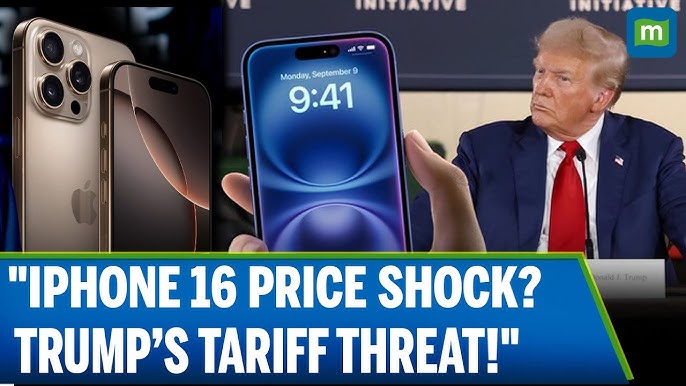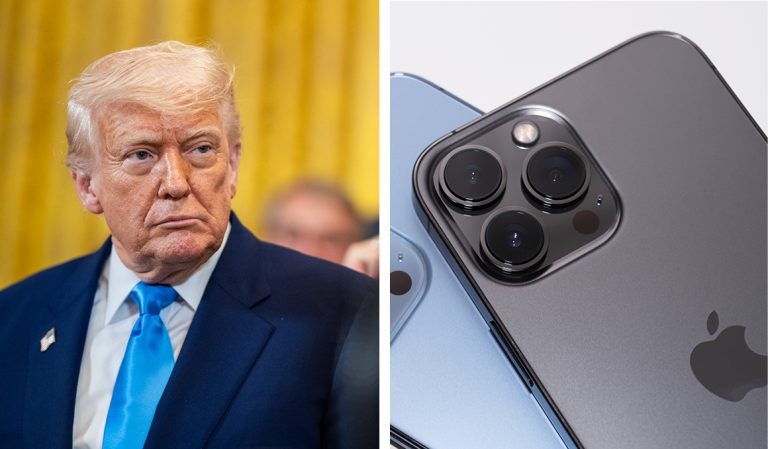Former President Donald Trump reignited tensions with Apple on Friday, threatening a 25% tariff on iPhones not manufactured in the United States. In a Truth Social post, Trump insisted that Apple must relocate its iPhone production from countries like India back to U.S. soil. This warning follows Foxconn’s recent $1.5 billion investment in India, aligning with Apple’s broader strategy to diversify manufacturing amid ongoing global trade instability. Trump’s remarks, made while visiting the Middle East, highlight his growing frustration with American companies shifting operations overseas to sidestep tariffs. He has also targeted other giants like Walmart, demanding they absorb tariff costs.
Trump Threatens Apple with 25% Tariff Over iPhone Production Abroad
Former President Donald Trump issued a sharp warning to Apple on Friday, threatening the tech giant with a 25% tariff on iPhones if it does not relocate its production to the United States.
Trump’s Message to Apple and Tim Cook
In a post on Truth Social, Trump reiterated his long-standing demand that iPhones sold in the U.S. be manufactured domestically.
“I have long ago informed Tim Cook of Apple that I expect their iPhones that will be sold in the United States of America will be manufactured and built in the United States, not India, or anyplace else,” Trump wrote. “If that is not the case, Apple must pay a tariff of at least 25% to the U.S. Thank you for your attention to this matter!”
Apple’s Growing Investment in India
Trump’s comments follow closely on the heels of Foxconn’s announcement of a $1.5 billion investment in its India operations. As one of Apple’s key manufacturing partners, Foxconn’s expansion signals Apple’s broader strategy to shift a significant portion of its production away from China to India amid ongoing global trade tensions.
Earlier this month, during an earnings call, Apple CEO Tim Cook confirmed the transition, stating that most iPhones sold in the U.S. “will have India as their country of origin.”
Tensions Rise Amid Trump’s Tariff Push
CNN reported that Trump expressed frustration over Apple’s production shift while traveling in the Middle East last week. According to the outlet, Trump and Cook met on Tuesday, although specific details of their conversation remain undisclosed.
This move is part of a broader trend in which Trump has ramped up criticism of major corporations seeking to avoid U.S.-imposed tariffs. Over the weekend, he called on Walmart to “EAT THE TARIFFS,” insisting the retail giant should absorb the additional costs rather than pass them on to consumers.

FAQs
Why is Donald Trump threatening a 25% tariff on iPhones?
Trump wants Apple to relocate iPhone manufacturing to the U.S. and has threatened a 25% tariff on devices made overseas to pressure the company into reshoring its production.
Which countries currently manufacture iPhones?
Apple produces many of its iPhones in countries like China and, more recently, India—where Foxconn has made a $1.5 billion investment to expand operations.
What is Foxconn’s role in iPhone production?
Foxconn is a major Apple manufacturing partner. It assembles a significant portion of Apple’s hardware, including iPhones, and recently expanded its operations in India to support Apple’s supply chain shift.
How has Tim Cook responded to the issue?
Tim Cook acknowledged during an earnings call that most iPhones sold in the U.S. will soon have India as their country of origin, reflecting Apple’s effort to diversify manufacturing outside of China.
Has Trump targeted other companies over tariffs?
Yes. In addition to Apple, Trump has criticized companies like Walmart, urging them to absorb tariff costs themselves rather than passing them on to American consumers.
Conclusion
Donald Trump’s renewed call for Apple to bring iPhone production back to the U.S. underscores his broader strategy of economic nationalism and tariff enforcement. With Apple deepening its ties to India through partners like Foxconn, the former president’s threats mark a potential clash between political pressure and global supply chain realities. As U.S. companies navigate trade policy and manufacturing shifts, the debate over tariffs and domestic production is poised to remain a contentious issue in American economic discourse.


